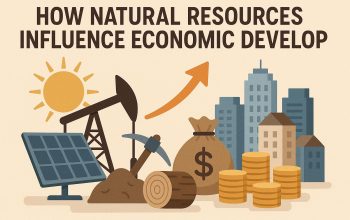Introduction
Technological innovation has consistently been a critical driver of economic growth. The introduction of new technologies can improve productivity, create new industries, and foster employment growth. This article delves into the various ways technological advancements contribute to economic development and highlights key examples.
Improving Productivity
One of the primary ways in which technological innovation fuels economic growth is by enhancing productivity. With the advent of new technologies, businesses can produce more output with the same or fewer resources. For instance, the introduction of automation and robotics in manufacturing has not only streamlined processes but also significantly increased production rates.
Automation in various sectors has played a pivotal role in improving productivity. Automated systems can perform repetitive tasks faster and with greater accuracy than human workers, reducing errors and increasing efficiency. In the manufacturing sector, the implementation of robotic systems allows for 24/7 production cycles, wherein machinery can operate continuously with minimal human supervision. This shift has led to substantial cost savings and has significantly transformed the manufacturing process, allowing companies to produce goods at a lower cost and higher speed.
A study by the McKinsey Global Institute found that automation could raise productivity growth globally by 0.8 to 1.4 percent annually. By reducing the time and labor required for production, technological advancements enable firms to operate more efficiently, leading to economic growth. Moreover, tech innovations in the service sector have also enhanced productivity. For instance, customer relationship management (CRM) software helps companies manage interactions with potential and current customers more effectively, resulting in better customer satisfaction and increased sales.
Creating New Markets and Industries
Technological innovation often leads to the creation of entirely new markets and industries. The development of the internet is a classic example, having spawned numerous industries such as e-commerce, digital marketing, and cybersecurity. Each new industry not only provides opportunities for business but also contributes to economic expansion through job creation and increased consumer spending.
The internet revolution has reshaped how businesses operate and how consumers interact with services and products. For instance, e-commerce platforms like Amazon and Alibaba have revolutionized retail by offering products globally and reducing the barriers to buying and selling goods. This shift has not only created millions of jobs worldwide but has also facilitated small and medium-sized enterprises (SMEs) to reach consumers beyond geographical boundaries, furthering economic growth.
For example, the smartphone revolution, spearheaded by companies like Apple and Samsung, led to a surge in applications and services, from social media platforms to mobile payment systems. These innovations continue to contribute to global economic growth by generating billions in revenue and creating millions of jobs worldwide. The app development industry alone has burgeoned, with developers around the world creating apps for various needs, thus stimulating economic activity in both technology and non-tech sectors.
Fostering Employment Growth
While there is a concern that technology might displace certain jobs, innovation often creates more employment opportunities than it eliminates. The jobs supported by technology are typically characterized by higher skill requirements and wages.
The emergence of technology-driven sectors such as artificial intelligence (AI) and data analytics has created high-demand job roles. These sectors require skilled professionals who can develop, implement, and maintain sophisticated systems and analyze vast amounts of data, thus creating a demand for a well-educated workforce. Such roles not only offer competitive salaries but also enhance workers’ skills, contributing positively to the broader economy.
According to Oxford Economics, the rise of technology-driven sectors is expected to create more jobs than they displace over the coming decades. This pattern was evident during the Industrial Revolution and continues in the digital age, with sectors such as data analytics, AI development, and renewable energy seeing substantial job growth. The need for IT consultants, cybersecurity experts, and renewable energy engineers is driving economic development by not only creating new job opportunities but also by enhancing the competitiveness of the workforce in the global market.
Enhancing Global Competitiveness
Technological innovation boosts not only national but also global competitiveness. Countries that prioritize research and development often find themselves at the forefront of economic growth and innovation. The drive to innovate labors not only domestic but international productivity as state-of-the-art technologies are adopted and adapted globally.
For example, in the telecommunications sector, the rapid adoption of 5G technology is set to change the landscape of various economic sectors, from healthcare to transportation. The enhanced speed and connectivity offered by 5G technology enable the development of new applications and services, such as telemedicine and autonomous vehicles, which create new economic opportunities. Nations leading in 5G development, such as South Korea and the United States, are poised to gain significant competitive advantages in these fields, which translates to enhanced economic performance and a stronger presence in the global market.
Moreover, innovation in renewable energy technologies is also contributing to global competitiveness. Countries investing in solar, wind, and other renewable energy sources are not only addressing environmental concerns but are also opening new economic avenues. By developing and exporting renewable energy technologies, these countries can establish themselves as leaders in the global energy market, contributing to their overall economic prosperity.
Conclusion
Technological innovation remains a vital catalyst of economic growth, driving improvements in productivity, creating new industries, fostering employment, and enhancing global competitiveness. As we continue to advance and embrace new technologies, the potential for economic development appears boundless. By investing in and adapting to these innovative changes, economies worldwide can ensure sustained growth and prosperity.
It is crucial for governments, businesses, and educational institutions to collaborate in nurturing technological advancements. This involves investing in research and development, enhancing educational curricula to meet the demands of tech-based economies, and creating policies that encourage innovation while addressing the societal impacts of technological change. Such strategic initiatives can pave the way for a more robust and resilient global economy equipped to handle future challenges and opportunities presented by technological progress.
This article was last updated on: July 28, 2025




